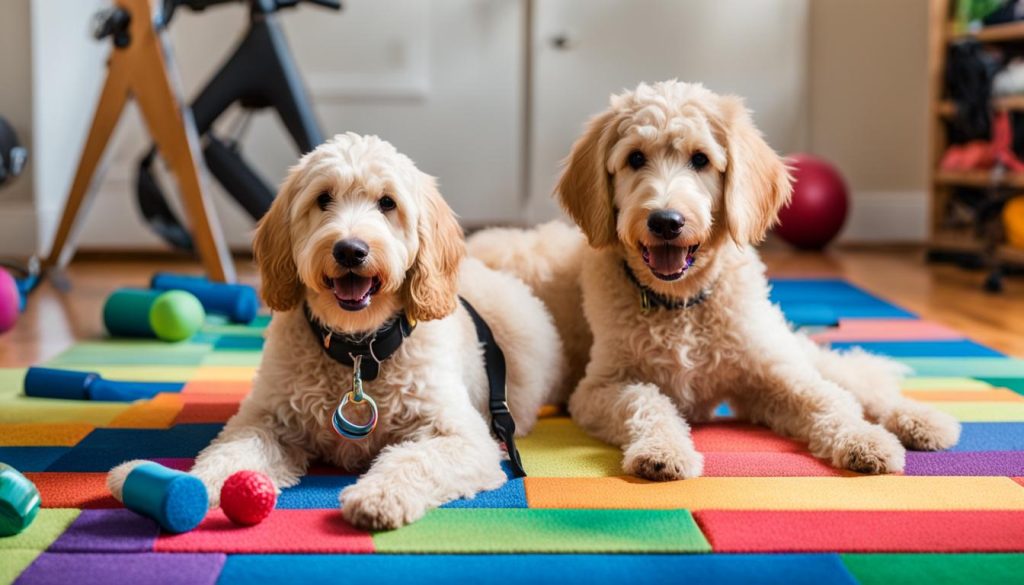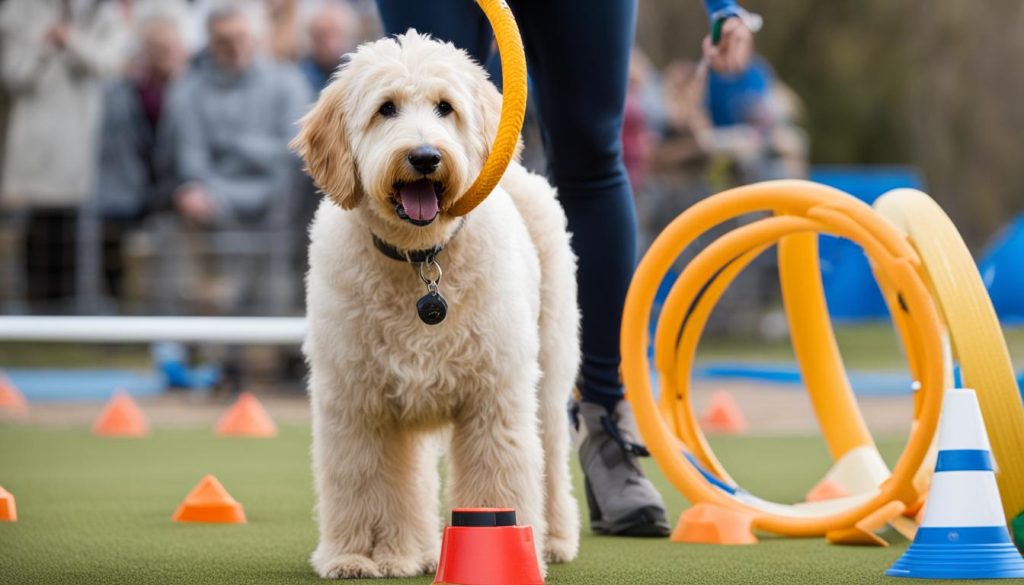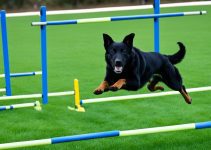Goldendoodles are a popular breed known for their intelligence, loyalty, and friendly nature. As a dog owner myself, I understand the importance of training when it comes to creating a well-behaved and obedient pet. Whether you’re a new goldendoodle owner or looking to fine-tune your training techniques, I’m here to share some expert tips and tricks to help you on your journey.
When it comes to goldendoodle training, consistency is key. Consistently using positive reinforcement techniques and providing early socialization can have a significant impact on their behavior. These intelligent and eager-to-please dogs respond well to positive reinforcement, making training an enjoyable and rewarding experience for both you and your furry companion.
So, whether you’re starting with goldendoodle puppy training or working on obedience training for an adult goldendoodle, the following tips and techniques will help you achieve success:
Discover Goldendoodle Training
- Consistency and positive reinforcement are vital for successful goldendoodle training.
- Start training early to establish good behaviors and prevent future issues.
- Basic obedience commands and socialization are crucial for a well-rounded goldendoodle.
- Potty training and crate training are essential for housebreaking and providing a safe space.
- Professional training can offer additional guidance and expertise for more advanced training goals.
The Importance of Early Training for Goldendoodles
When it comes to goldendoodle training, starting early is key. Goldendoodles are highly receptive to learning and forming habits at a young age, making it the perfect time to establish a strong foundation for their behavior. Early training not only prevents future issues but also sets the stage for a well-behaved and obedient pet.
One of the most effective training techniques for goldendoodles is positive reinforcement. Using treats, praise, and playtime as rewards helps to reinforce desired behaviors and encourages them to repeat those behaviors in the future. This positive approach not only strengthens the bond between you and your goldendoodle but also enhances their overall learning experience.
Positive reinforcement training involves rewarding your goldendoodle whenever they exhibit the desired behavior. For example, when teaching them to sit, you can give them a treat and verbal praise every time they successfully sit on command. Over time, your goldendoodle will associate sitting with positive experiences and will be more likely to comply with the command.

Consistency is crucial during the early training phase. Establish a routine and stick to it, ensuring that you provide clear and consistent cues for your goldendoodle to follow. This helps them understand what is expected of them and aids in the learning process.
Early training also includes socialization. Exposing your goldendoodle to different people, animals, and environments at a young age helps them become well-rounded and confident pets. Take them to parks, introduce them to other friendly dogs, and allow them to explore new places under controlled circumstances. This exposure will help prevent fear or anxiety-related issues later on.
Remember, goldendoodle training is a journey that requires patience, dedication, and positive reinforcement. By starting early and using effective training techniques, you can shape your goldendoodle into a well-behaved and happy companion.
Essential Training Techniques for Goldendoodles
When it comes to training your goldendoodle, there are several essential techniques that can help you shape their behavior effectively. From basic obedience training to socialization, potty training, and crate training, each aspect plays a crucial role in their development.
Basic Obedience Training
Teaching your goldendoodle basic commands like sit, stay, and come is vital for their overall behavior. These commands establish a foundation of obedience and ensure that your goldendoodle understands your expectations. Use positive reinforcement, such as treats and verbal praise, to reward their correct responses and encourage their cooperation.
Socialization
Socializing your goldendoodle is important to expose them to various people, animals, and environments. This helps them become well-adjusted and friendly pets. Take your goldendoodle for walks in different settings, introduce them to other dogs, and allow them to interact with people of all ages. Gradually increase the level of exposure to different scenarios to build their confidence and reduce anxiety.
Potty Training and Crate Training
Housebreaking is an essential aspect of goldendoodle training. Consistency and patience are key when it comes to potty training. Establish a routine, take your goldendoodle outdoors regularly, and reward them for going in the designated area. Crate training is also important as it provides your goldendoodle with a safe and secure space of their own. Use positive reinforcement and gradually introduce them to the crate, making it a positive and comfortable environment.
By implementing these essential training techniques consistently, you can effectively shape your goldendoodle’s behavior. Remember to be patient and understanding throughout the training process, as each dog learns at their own pace. With dedication and positive reinforcement, your goldendoodle will become a well-behaved and happy companion.

Tips for Successful Goldendoodle Training
When it comes to training your goldendoodle, consistency and positive reinforcement are key. By implementing effective training techniques and following these valuable tips, you can ensure the best results for your furry friend.
Start Training Early
Training should begin as soon as you bring your goldendoodle puppy home. Starting early allows you to establish good habits and prevent any behavior issues from developing. This is a critical period for your goldendoodle’s learning and development.
Set Clear Boundaries and Expectations
From day one, it’s important to set clear boundaries and expectations for your goldendoodle. This helps them understand what is acceptable behavior and what is not. Consistency is key in reinforcing these boundaries to avoid confusion.
Establish a Strong Bond and Trust
Building a strong bond and trust with your goldendoodle is crucial for successful training. Use a calm and assertive energy when working with your dog to establish yourself as the leader. Consistent training sessions will create a sense of trust and understanding between you and your goldendoodle.
Focus on Basics Before Advancing
When training your goldendoodle, it’s important to focus on teaching the basics before moving on to more advanced commands. Start with simple commands like sit, stay, and come. Once your goldendoodle has mastered these, you can progress to more complex training exercises.
Use Positive Reinforcement
Positive reinforcement is a highly effective training technique for goldendoodles. Use treats, verbal praise, and clicker training to reward good behavior. This encourages your goldendoodle to repeat the desired actions and strengthens the training bond between you.
Remember, training your goldendoodle takes time and patience. By implementing these tips and techniques, you can create a positive and rewarding training experience for both you and your furry companion.
Conclusion
Goldendoodle training is a crucial aspect of their development, ensuring that they grow up to be well-behaved and contented pets. By following key strategies such as starting early, utilizing positive reinforcement, and maintaining consistency, you can effectively train your goldendoodle.
However, it’s important to note that professional goldendoodle training can provide valuable guidance and expertise. Trainers who specialize in goldendoodles understand their unique needs and can offer tailored solutions to address any training challenges you may encounter.
With patience, dedication, and the right training approach, you can establish a strong bond with your goldendoodle and enjoy a mutually rewarding relationship. Remember to celebrate each milestone and focus on building positive associations with training, turning it into a fun and engaging experience for both you and your furry companion.
FAQ
Are goldendoodles easy to train?
Goldendoodles are known for their intelligence, making them relatively easy to train. With consistency and positive reinforcement, you can teach them various commands and behaviors.
When should I start training my goldendoodle?
It is best to start training your goldendoodle as early as possible, ideally when they are a puppy. Early training helps establish a strong foundation and prevents future behavior issues.
What is the most effective training technique for goldendoodles?
Positive reinforcement is the most effective training technique for goldendoodles. Using treats, praise, and playtime as rewards motivates them to repeat desirable behaviors.
What basic obedience commands should I teach my goldendoodle?
It is crucial to teach your goldendoodle basic obedience commands such as sit, stay, come, and leave it. These commands establish good behavior and improve their responsiveness.
How can I socialize my goldendoodle?
Socialization is important for goldendoodles to become well-rounded and confident pets. Expose them to different people, animals, and environments gradually, ensuring positive experiences.
How can I potty train my goldendoodle?
Potty training your goldendoodle involves establishing a routine, taking them outside frequently, and rewarding them for eliminating in the appropriate area. Consistency is key.
Is crate training necessary for a goldendoodle?
Yes, crate training is essential for housebreaking and providing a safe space for your goldendoodle. It helps teach them to control their bladder and gives them a sense of security.
Should I seek professional goldendoodle training?
Professional goldendoodle training can provide additional guidance and expertise, especially if you are facing specific challenges or need help with advanced training techniques. It can be beneficial for both you and your goldendoodle.






